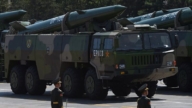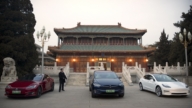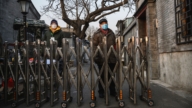【新唐人2013年08月14日讯】早前有香港媒体透露,中共北戴河会议上将有一暗一明两条主线:暗线是薄熙来案;明线是中共三中全会的经济改革方案。而被中共总理李克强看做自己的“孩子”一样的《上海自由贸易试验区总体方案》却遭到了中共内部不同利益集团的强烈反对。外界观察,在这次北戴河会议上,中共高层各派争夺的不仅是薄熙来的死活,还围绕着李克强的经济改革方案进行激烈的博弈。“李克强的孩子”是否会胎死腹中,北戴河会议上是否会因此“打破头”,我们来看专家的分析。
中共喉舌《中新网》曾报导,李克强7月3号主持召开的国务院常务会议中,原则上通过了《中国(上海)自由贸易试验区总体方案》。
不过,大陆媒体8月5号引述香港《南华早报》的报导却出现了不同的声音。报导指称,“上海自贸实验区”执行方案至今未公布,部分原因在于“上海自贸区”与国内现行法律存在着部分冲突。提出必须先修补“法律漏洞”,才能宣布自贸区细则。
但让人奇怪的是,中共商务部新闻发言人沈丹阳8月7号在接受媒体采访时表示,“上海自贸区”建设是下半年区域经济发展重点,自贸区总体方案很快将正式审定批准公布。
被一位政府消息人士形容为“李克强的孩子”的“上海自由贸易区”,是“李克强经济学”的一部分,但却受到中国银监会和中国证监会的强烈反对。香港《南华早报》引述了解中共高层会议一手内幕的三位消息人士的消息,指称,在一次国务院闭门会议上,李克强曾为此拍桌子发火。
经济评论专家杰森:“当李克强提出来,我能不能放松一点,我们在上海搞一个‘自由贸易区’,把银行金融管制在这个贸易区里稍微放松一点,受到了巨大的阻力。实际上这个利益集团,它就是这样一个属性。它只能不断的加大它的利益进去,绝不可能有任何让利的因素。”
在北戴河会议期间,同样放风出不和谐音的,还有“国企改革”。
直属中共国务院的中央级党报,北京《经济日报》近日连发5篇文章“解析国企改革热点”。文章说,国企不能私有,否则必将动摇中国根基。又说俄罗斯当年“均分国资”的后果,导致了重大经济灾难。
北京社会经济科学研究所所长陈子明:“苏联是把国有资产‘全民股份化’了。现在中国学者提的还没到这一步。这些提法我觉得都是很正常的。各个国家,包括中国的香港、澳门,都在广泛采用。谈不上‘导致国家崩溃’这些耸人听闻的说法。”
香港《明报》10号的文章翻出了,大陆招商局集团前董事长、太子党秦晓,2010年在清华大学发表的演说。秦晓当时就提出了“应有序、公平地将庞大的国有资产分散到民众手中”。
实际上,中国经济学界很多人,包括著名经济学家吴敬琏、杨帆等都提出过这一观点。
杰森:“李克强刚上台,信誓旦旦的要放弃历史上的这种刺激。然后银行就给他下马威,就搞‘钱荒’,整个经济开始走缓,致使他不得不开始又‘保7’。所以说,整个中国实际上是被历史上形成的利益集团在控制着。各个官员,他只是在利益集团之间,试图想平衡一下关系。”
不过,即使李克强之前为“上海自由贸易区”怒拍桌子,在北戴河会议上,也将就经济措施力排众议,仍然被认为没有触及到中国经济需要改革的根本。
杰森:“不是说,是真的把现有的中共利益集团的资产分给老百姓。他们根本这连谈都不会谈的。他们所谓谈的是,让它不要像现在这样,搞的这么疯狂。”
许多海外分析师认为,经济改革在胡温执政时陷入停滞,新一届领导现急于重启改革。否则经济下滑将引发民众不满,从而可能导致中共失去领导权。
采访/刘惠 编辑/尚燕 剪辑/李勇
Internal Conflicts Reported in Beidaihe Meeting
Hong Kong media has revealed the Chinese Communist
Party (CCP) Beidaihe meeting will have two main threads.
The hidden thread is the Bo Xilai case; and the visible
thread is the Third Plenum of the CCP economic reforms.
Shanghai Free Trade Area (FTA) is deemed
the brain-child of Chinese Premier Li Keqiang.
This project has been strongly opposed
by different interest groups within the CCP.
Outside observers commented that during the
Beidaihe meeting, the CCP leadership factions
are not only competing over Bo’s life or death.
They are also fighting about Li Keqiang’s economic reforms.
Will Li Keqiang’s program come to fruition? Will they resolve
problems in the Beidaihe meeting? Let’s look at the reports.
CCP state-controlled China News Network
has reported that Li Keqiang chaired a
State Council executive meeting on July 3.
He has adopted China (Shanghai) FTA Program.
However, the mainland Chinese media quoted news
from the South China Morning Post on August 5.
There were different angles appearing.
Reports alleged that Shanghai FTA experimental
zone executive program has not been released.
This is, in part, because the Shanghai Free Trade Zone
has come into conflict with the existing domestic laws.
It is said that legal loopholes must be fixed
first before declaring free trade area rules.
CCP Ministry of Commerce spokesman Shen Danyang
commented during an interview on August 7.
Construction of the Shanghai FTA is a priority of regional
economic development during the second half of the year.
The FTA overall program will soon be officially approved.
Shanghai FTA was described as Li Keqiang’s
brain-child by a government informant.
It was part of Li Keqiang economic reform, but faces strong
opposition by the China Banking Regulatory Commission.
It also faces opposition from the China
Securities Regulatory Commission.
South China Morning Post quoted three first-hand
informants within the CCP high-level meeting.
They alleging that during a closed-door meeting
of the State Council, Li Keqiang got angry about it.
Jason Ma, Economic Review Expert:
“Li Keqiang proposed relaxing a little bit,
and forming a Shanghai free trade zone.
He wanted to relax the banking and financial regulations
in this zone, but encountered a lot of opposition.
This interest groups has such an attribute.
It can only continue to increase its interests,
but absolutely will not give away any.”
During the Beidaihe meeting, proposed reform of
state-owned enterprises also had disagreements.
The Economic Daily in Beijing, directly under the CCP
Central State Council, recently released five articles.
They “analyzed SOE reform hotspots," and said that
state-owned enterprises cannot be privately owned.
Otherwise, it will shake the foundation of China.
It also said sharing state-owned enterprises
in Russia led to a major economic disaster.
Chen Ziming, Head of the Institute of
Socio-Economic Sciences in Beijing:
“The Soviet Union made state-owned
assets into national demutualization.
Now Chinese scholars have not mentioned
this step. I think these comments are normal.
It is widely used in various countries, including Hong Kong
and Macao in China. It won’t cause state collapse.”
Ming Pao in Hong Kong recalled a speech from
princeling ,Qin Xiao at Tsinghua University, in 2010.
Qin is the former Chairman of China Merchant Group.
Qin mentioned at that time that “it should orderly and
equitably distribute huge state-owned assets to people.”
Many in Chinese economic circles have put forward this
view, including famous economists Wu Jinglan and Yang Fan.
Jason Ma: “Li Keqiang just took office, and
vowed to give up this historical hangover.
Then banks opposed him, and created money
shortages, and the economy started to slow.
This caused him to have to start to keep the seven rules.
So the economy of China is actually being
controlled by interest groups formed in history.
Various officials are just between different
interest groups, and are trying to balance it.”
Li Keqiang became angry with the issues
over the Shanghai Free Trade Area.
He will be against all the odds at the Beidaihe
meeting for his economic measures.
However, it is still considered that it does not touch
the fundamental needs of China’s economic reform.
Jason Ma: “It’s not really to distribute assets of the
existing interests groups of the CCP to the people.
They would not even talk about that. What they
talked about was not to be more considered.”
Many foreign analysts believe that economic reforms
were stalled when Hu and Wen were in power.
The new leaders are eager to restart reforms.
Otherwise, the economic downturn will lead to public
discontent, and make the CCP leadership weaken.




























